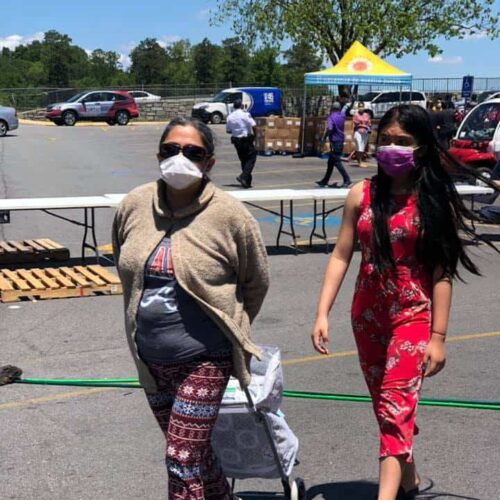Introduction
Read the Spanish version here. Lea la versión en español aquí.
The bad news swept through the iconic Bellagio hotel in Las Vegas.
About 2,000 housekeepers — mostly Black women and Latinas — were called into four separate conference rooms. Supervisors told them guests were cancelling their reservations because of the spread of COVID-19. Within a matter of minutes that Sunday afternoon in March, they were all laid off.
Modestina Rivera, who’d been cleaning rooms at the Bellagio for more than three years, was terrified. She and her husband, who is retired, stopped paying their bills in April. Their landlord gave them until the end of the summer to produce rent money. Rivera doesn’t know what will happen.
“It made me very sad,” Rivera, 57, said in Spanish.
Friday’s jobs report released by the Bureau of Labor Statistics showed companies began hiring again in May, adding 2.5 million jobs after shedding a record 22 million in March and April. But most of the job gains went mostly to white workers. Unemployment among Black women and Asians actually ticked up slightly. Latinas such as Rivera continue to suffer, with the highest unemployment rate of any racial or gender group by far.
And Rivera is still unemployed.
A record 19 percent of Latina workers were unemployed in May. About 16.8 percent of Black workers were out of work, the next highest unemployment rate for a racial group. The gap between the jobless rates of Latinas and white men was the largest: 8.3 percentage points.
Economists say the disparity comes from institutional barriers that limit many Latinas to the lowest paid service jobs, which typically require close contact with people. For example, many Latinas are employed as store clerks, home health aides and childcare workers, and they’re far more likely than other racial groups to work as housekeepers and janitors. These service industry jobs have disappeared at an alarming rate during the pandemic.
The leisure and hospitality industry has shed the most jobs: 7.5 million in April. In May, the industry added back 1.2 million jobs, but not enough to reverse the damage. Nearly one in four hospitality workers are Latino, like Rivera.
The high unemployment rate, which fell to an overall 13.3 percent in May, is all the more painful for Latinas because they’re the lowest paid workers in the United States, said Sylvia Allegretto, a labor economist and co-chair of the Center on Wage and Employment Dynamics at the University of California, Berkeley.
“Since most [Latinas] are low-income earners, they don’t have savings to weather the storm,” Allegretto said. “COVID is exposing inequities that have long existed.”
From February to May, the unemployment rate for Latinas shot up 14.1 percentage points, the largest increase for any racial and gender group. The unemployment rate for white men has increased 7.8 percentage points.
The unequal job losses are the latest example of the pandemic’s unequal impact on people of color. Latinos are at high risk of exposure to COVID-19, the disease caused by the coronavirus, because they’re more likely to have transportation, warehousing and cleaning jobs that are considered essential, and are therefore required to work. Black people are more likely to die from the coronavirus. Asian Americans have reported being the target of a spike in hate crimes and racist behavior because of the disease.
Rivera told Public Integrity that she’s still waiting to get the $600 a week unemployment aid Congress granted unemployed workers as part of the Coronavirus Aid, Relief, and Economic Security Act. Many states were unprepared to handle the flood of applications, delaying payments. But the benefits won’t last beyond July, unless Congress votes to extends them.
Many economists believe Congress should take bolder steps to speed up the recovery for this vulnerable workforce.
Allegretto and others have advocated for the federal government to temporarily pay workers’ salaries so they don’t lose their jobs. Others are pushing for more spending on Supplemental Nutrition Assistance Program benefits, which would provide immediate relief to the poorest households. Policies aimed at helping the poorest families, they say, will keep Latinas from falling further behind.
A workforce on edge
Hispanic women have always been particularly vulnerable to economic downturns. They are the lowest paid workers, earning about $678 a week compared with the national median of $957 a week. They are the least likely to own a home or have a college degree. And decades of discrimination have locked many Latinas into inflexible jobs that offer few benefits.
Yet nothing has hit Latinas quite as hard as the economic fallout from the coronavirus pandemic. Even the Great Recession of the late 2000s didn’t cause as many economic troubles. Back then, men lost jobs at a higher rate. Unemployment among Black men peaked at 19.3 percent and among Latino men at 13.8 percent. Millions of women of all races lost their jobs, too, but the rate spiked at 8.4 percent.
The unequal effect is caused by what economists call “occupational segregation.” This happens when a demographic group is overrepresented or underrepresented in certain jobs. Latino men are overrepresented in the construction industry, for example, and African American men make up a large share of public bus drivers.
Millions of jobs in these industries were lost during the housing crisis in 2008 and 2009.
As the economy recovered, so did the job market, adding millions of new healthcare and hospitality jobs. By December 2019, there were far more jobs available than there were workers to fill them. Unemployment among Latinos, Blacks and every racial group had fallen to a record low.
The gains were wiped out in March as people hunkered down at home to avoid contracting COVID-19. But during this downturn, women are the ones who are losing their paychecks.
Especially Latinas.
Numbers from the latest jobs report shows that most layoffs are happening in service sectors. The leisure and hospitality industry — travel, dining and entertainment — relies heavily on in-person services that have been curtailed or outright banned during the pandemic.
That’s why Latinas are experiencing the worst of the fallout. They held nearly a third of all service jobs in 2019, according to the Bureau of Labor Statistics. Latinas are also overrepresented in sales jobs, holding 29 percent of them in 2019.
There’s a good chance that Latinas who didn’t get laid off are considered “essential workers,” which puts them at a higher risk of contracting COVID-19. Latinos (men and women) make up 20 percent of the essential workers in transportation and warehousing, and 40 percent of essential workers who clean and maintain industrial, commercial, residential buildings.
“It’s like the worst of all worlds. It’s the worst of COVID,” said Randy Albelda, a labor economist at the University of Massachusetts in Boston, who studies low-wage workers. “[Latinas] are in these industries where they’ve been laid off in droves and they’re also overrepresented among front-line workers.”
Rita Terrero is one of the 1.5 million Latinas who have been laid off since March. She’d been working for two years as a travel agent in Atlanta when the coronavirus hit Georgia. By mid-March, her company’s clients were canceling travel tours, conventions and conferences. By the end of that month, all 30 people in her department were let go.
“I cried like a baby,” said Terrero, 60, who had to borrow money from her siblings to pay her bills in April and May. “I was having health issues and was very worried about staying on my insurance.”
She said her former employer is paying laid-off workers’ health insurance premiums through the end of July. Her insurance covers the $298 per month to pay for her prescription inhalers. Terrero doesn’t know how she will come up with the money come August.
All the uncertainty has depressed Terrero. She now consults a therapist each week. Therapy helps, she said, but it won’t save Terrero from financial ruin. She frequently checks her email for a message from her former boss telling her she can have her job back.
So far, no such message has come.
Holes in the safety net
Since March, phones have been ringing nonstop at the Latin American Association in Atlanta, which serves more than 40,000 Latinos in the region.
In more normal times, the nonprofit group helps Hispanic families in Georgia open small businesses, resolve immigration matters and apply for college.
All that has changed. Now their clients need help with more basic matters — like paying their rent.
“That’s the number one thing our community needs right now, hands down,” said Aixa Pascual, managing director of advocacy for the association.
The group has helped more than 900 families apply for rental assistance in the past three months. A large share of Georgia’s 1 million Latino population are undocumented immigrants from Mexico and Central America. They aren’t eligible for unemployment benefits, or coronavirus aid from Congress. Nonprofit groups have been issuing checks, but money is limited.
A lot of the people seeking help from the Latin American Association are Latina workers who were laid off from their jobs cleaning hotels and private homes.
But Latinas are also teachers and business owners.
In March, Pamela Rodriguez lost her job as a substitute teacher in Atlanta’s public schools. Since then, she’s been depending on others to help her pay bills. Rodriguez, a single mom of a 17-year-old daughter, earned $85 a day teaching. She also had to close down her beauty salon, where she did facials and lash extensions.
Rodriguez, 49, didn’t make enough money teaching to qualify for unemployment benefits, so she and her daughter live off the child-support payments her ex-husband sends each month.
“I am scared,” Rodriguez said. “I am single, I am a woman and a Latina, and I can feel the pressure.” Rodriguez, who is from Panama, said the $1,700 stimulus check she got from the IRS covered one month’s rent. That’s hardly enough. She lives paycheck-to-paycheck, as most Latino workers do.
“I am scared. I am single, I am a woman and a Latina, and I can feel the pressure.”
Pamela Rodriguez
On balance, Latino families haven’t recovered from the Great Recession as quickly as white families. Latinos lost 66 percent of their household wealth in the last economic downturn, the largest decrease of any racial group. (Whites lost just 16 percent).
As the economy improved, Latino wealth grew more than 50 percent by 2016, but still not reaching pre-recession levels.
Women such as Rodriguez and Rivera don’t have the assets to support them through the pandemic, which threatens to set back Latinos’ slow progress toward building wealth.
Congress has options
In economic terms, the good news about the coronavirus pandemic is that for one month at least, the loss of jobs stopped, and some people returned to work.
But economists warn that the financial pain could last for years.
“It’s going to be one step forward and two steps back,” said Allegretto, of the University of California, Berkeley.
Allegretto hopes Congress will expand the extra $600 weekly unemployment checks, pegged to expire in July, through the end of the year. But it is unlikely.
Albelda, of the University of Massachusetts, said one of the best ways to help low-income unemployed Latinas is to increase Supplemental Nutrition Assistance Program benefits, commonly known as food stamps. (About 10 million Latinos receive the food subsidies each month).
These potential solutions would still leave out millions of low-income Latinas who are undocumented immigrants, making them ineligible for unemployment insurance, stimulus checks and other benefits Congress has provided to workers.
Pascual at the Latin American Association wants Congress to extend stimulus aid to unauthorized immigrants who have a record of paying taxes.
“They work very hard, and right now they need help,” Pascual said.
Fear of returning to work
The Las Vegas strip is starting to creep back to life. Many casinos and hotels reopened Thursday, including the Bellagio hotel where Rivera cleaned rooms.
The hotel’s fountains marked the grand reopening timed to “Viva Las Vegas.”

But not everyone is celebrating. Hospitality workers are afraid to return to work and potentially contracting COVID-19.
The Culinary Workers Union Local 226, which represents Rivera and 60,000 other casino and hospitality workers in Nevada, has urged elected officials to require casinos to regularly test employees for COVID-19 and provide them with masks, gloves and a plan that outlines steps to keep them safe. More than half of the union’s members are Latinas.
Rivera rallied with thousands of her former colleagues earlier this month in a caravan along the Las Vegas strip. They honked and held signs that read “Reopen Vegas the Safe Way.”
But Rivera still hasn’t returned to her job and doesn’t know when managers at the Bellagio, who could not immediately be reached for comment, will call her back. She missed her rent payment in June.
“Of course, I’m terrified, everyone is,” Rivera said. “Not only did we lose our jobs, now we’re afraid of returning. This is a matter of life or death.”
Read more in Health
Coronavirus and Inequality
Small business loan data includes little about race
Small Business Administration released the loan data after Public Integrity and other news organizations sued the agency.
Barriers to the Ballot Box
‘I wanted my vote to be counted’: In South Carolina, a peek at COVID-19’s impact on elections
As coronavirus prompts polling place closures for primaries, burdens fall heavily on voters of color.




Join the conversation
Show Comments